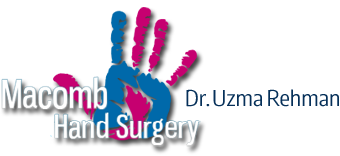Hand Doctors Explain the Disabilities of the Arm, Shoulder and Hand “DASH Score”
If you have injured your hand, arm or shoulder, your hand doctor and/or your hand therapist may have referred to your “DASH Score” at some point. In this article Detroit area hand doctor, Dr. Uzma Rehman explains what a DASH Score is and why it’s important.
The Disabilities of the Arm, Shoulder and Hand “DASH Score”
The Disabilities of the Arm, Shoulder and Hand (DASH Score) measures symptoms of musculoskeletal disorders and disability of the upper limb.
Taken as a self-reported questionnaire, the DASH Outcome Measure uses 30 questions to measure a patient’s physical function and symptoms pertaining to one or several musculoskeletal upper limb disorders. The questionnaire asks the patient to rate the difficulty performing certain upper extremity activities on a 5-point Likert scale, and the impact any limitations have on their daily routine.
The DASH Score is an accurate test to help Dr. Rehman evaluate and monitor the patient’s disability experience with upper limb disorders over time. The DASH Score can be used to measure and assess all joints in the upper extremity of the body, which is a significant advantage to all researchers and clinicians who study this area.
High Performance DASH Score
Patients with physically demanding jobs such as athletes and performing artists have two optional DASH modules that Dr. Rehman may ask them to take. Certain performance issues only occur during peak demand levels in these special patient’s bodies. And these don’t fall within the scope of the 30-question Dash Outcome Measure. Clinicians in Dr Rehman’s Detroit, MI office find these additional four-item modules helpful to target specific concerns, which are scored separately from the DASH.
The optional high-performance modules of the DASH are provided to Dr. Rehman’s patients who operate within sport, music or specific industries. The Sports/Performing Arts Module is primarily given to musicians and athletes. The Work Module is given to patients with workman compensation issues or whose work performance is impacted by their physical limitations.
The QuickDASH Score
In comparison to the original 30-question Disabilities of the Arm, Shoulder and Hand Score, there is an abbreviated version called the QuickDASH. It contains just 11 items that the patient rates using the 5-point Likert scale to describe their function level when it comes to completing tasks, absorbing forces and how severe their symptoms are when doing so.
The optional high-performance modules for athletes, performing artists and workers who operate within high physically demanding jobs are also included in the QuickDASH.
Understanding Your DASH Score
The scoring system in both the DASH and QuickDASH is simple. Basically, the higher the score the greater the severity and disability, with the highest score of 100 being the most severe and 0 being none.
The standardized Disabilities of the Arm, Shoulder and Hand Score helps make outcome measurement more consistent and valid. This is essential when trying to determine the level of a patient’s injuries and if treatment is helping them improve over time, particularly for performance-based responses like range of joint motion or strength testing. Dr. Rehman takes a particular interest in her patient’s perspective on their status when it comes to outcome measurement.
The DASH (Disabilities of the Arm, Shoulder and Hand) is a standardized measure that enables patients to communicate to doctors and therapists the extent of their injury as well as their progress during recovery.
Top Detroit Area Hand Doctor
If you are suffering from an injury or pain in your fingers, wrist, elbow or arm, contact board certified hand Detroit area hand doctor Uzma Rehman, MD for a comprehensive evaluation and consultation. As with most medical conditions, early detection, awareness, and a prevention or treatment plan is the most effective way to combat the effects of any disability of the arm, shoulder or hand.
Doctor Rehman will assess your individual situation, and prescribe the treatments that are best for your condition.

